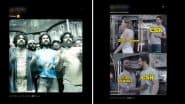New Delhi, Apr 30 (PTI) Damage to the 'medial' region of the prefrontal cortex -- the brain region that helps with planning and achieving goals -- could make one more impulsive and likely to be influenced by others, a new study has found.
The study's results, published in the journal PLOS Biology, "are important as every day we learn about what other people want, and this impacts on our own preferences for what we want," senior corresponding author Patricia Lockwood, from the University of Birmingham, UK, said.
The team, including researchers from the University of Oxford, UK, and Julius-Maximilians-University Würzburg, Germany, engaged 121 participants in a test and noted their responses.
"We used an experiment where we could look at whether it was when people behaved more impulsively, or if they were restrained, that social influence occurs," Lockwood said.
Thirty-three of the 121 participants had an injury to the medial prefrontal cortex, 17 had an injury elsewhere in the brain, while 71 had no brain damage but were of the same age as the others.
The group was shown a series of choices and gauged for their impulsive nature. They were then again presented with the same choices and also shown what other people would pick.
Some of the participants made very impulsive choices, while others made more patient choices, the researchers said.
The team used modelling and brain scans to map the size and location of injuries in the medial prefrontal cortex, and analysed the test results.
Findings of the analysis suggested that specific impulsive influences are driven by the different regions of the medial prefrontal cortex.
Injuries in the dorsomedial section -- which sits towards the top of the prefrontal cortex -- were shown to most significantly impact how one gets affected by other people's impulsivity.
Damage to another region -- the 'ventral' region of medial prefrontal cortex -- was found to cause short-sightedness in decision-making, where one would choose a smaller smaller reward earlier rather than wait for a larger prize.
"We show that the dmPFC (dorsal medial prefrontal cortex) is causally implicated in susceptibility to social influence, with distinct ventral portions of mPFC (medial prefrontal cortex) involved in temporal discounting," the authors wrote.
"These findings provide causal evidence for sub-regions of the mPFC underpinning fundamental social and cognitive processes," they wrote. PTI
(This is an unedited and auto-generated story from Syndicated News feed, LatestLY Staff may not have modified or edited the content body)













 Quickly
Quickly














